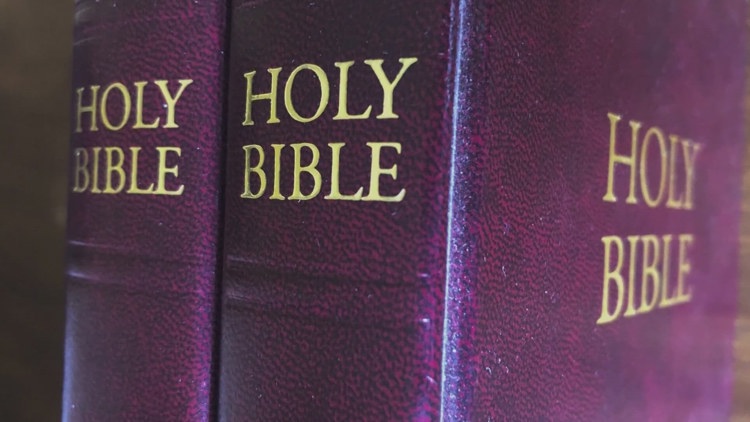
AUSTIN, Texas — The Texas State Board of Education took the final step needed Friday to advance a controversial curriculum that includes bible teachings. The board formally signed off on allowing bible-influenced content in the classrooms with a final vote of 8 to 7 in favor of the curriculum, which the Texas Education Agency developed. The TEA oversees more than five million students in public schools across the state.
"In my view, these stories are on the education side and are establishing cultural literacy," Republican board member Will Hickman said. "There's religious concepts like the Good Samaritan, the Golden Rule and Moses that all students should be exposed to." On Monday, more than 150 people signed up to testify in front of the Texas State Board of Education about the new proposed curriculum .
On Tuesday, board members took a preliminary vote on whether or not to adopt the curriculum before taking the final vote on the TEA-proposed curriculum. In September , the board heard from more than 100 speakers about their thoughts on this proposed curriculum. Since then, the TEA released updates to the lessons this October, but opponents said the changes are still insufficient.
The optional curriculum would apply to students in kindergarten through 5th grade. Bluebonnet Learning is state-developed material that provides a variety of lessons and resources elementary school teachers can use. Lesson plans include using the "Parable of the Prodigal Son" to help teach storytelling and using the story of Jesus's birth, life, death and resurrection to teach kids about Christianity's ties to the Roman Empire.
The curriculum was developed in response to House Bill 1605, which required the Texas Education Agency to develop materials for the state that would be approved by the State Board of Education. Staci Childs, an attorney and Democrat on the state Board of Education who voted against the curriculum, expressed concern that it could violate the First Amendment by apparently endorsing one religion over another. "In the kindergarten materials, 'Christian, Christianity, Christians' is referenced three times.
In first grade, it is referenced four times; second grade, referenced 17 times; third grade, referenced 190 times; fourth grade, referenced 81 times; fifth grade, it's referenced 66 times," Childs said. "If a parent or a teacher who didn't feel comfortable teaching this were to bring this up to a court, I believe they would be successful." Rocío Fierro-Pérez, the political director at the Texas Freedom Network, said they believe the curriculum violates the civil rights of students and families.
"We will be working with our legal partners to ensure that every superintendent in the state of Texas understands the kind of legal challenges that they might be expecting, the way we see across in other states that try to implement similar education and laws," Fierro-Pérez said. Fierro-Pérez said her organization plans to launch a grassroots effort to talk to superintendents about how they believe the curriculum will hurt students and the community. "We're going to be mobilizing across the entire state, with many of our partners to inform all of the school districts so that they understand the kind of curriculum that they could expect if their superintendents choose to adopt this curriculum," Fierro-Pérez said.
The material mainly focuses on telling biblical stories in English and Language Arts classes. For example, one teaching guide for second graders talks about how the biblical story of Queen Esther speaks to fighting for a cause and historical pushes for change. That same guide also includes teachings about Martin Luther King Jr.
, Rosa Parks and Cesar Chavez. "We want to use stories that they can relate to current events or stories from places they've been or places they've come from to try to connect to their learning. I don't know how the Bible stories will do that to all of our students," Ovidia Molina, the President of the Texas State Teachers Association, said.
"Our teachers are going to have a tough time because we go into education to ensure that our students are getting the best education possible, and teaching things that we know are not true and are part of Bible stories, that goes against what we believe as educators is our mission to teach an honest education and to ensure that our students have all of the information that is factual to prepare them for the world." Groups that support the curriculum like Texas Values believe it will provide students with a better understanding of history. "There are so many key pieces of literature, and even Shakespeare references the bible," Mary Elizabeth Castle, the Director of Government Relations for Texas Values, said.
"This will just help students, especially in a time when test scores are so low for reading." The curriculum is optional for Texas public schools. They do not have to opt in, but a financial incentive exists if they choose to.
If they do opt in, the state would give the district an extra $60 per student. "These budget-strapped districts may be looking to anything to help bring a few extra dollars into these very tight budget situations that they find themselves in," Kelsey Kling, a Government Relations Specialist & Policy Analyst for the Texas American Federation of Teachers, said. In recent weeks across the state, Molina said districts have been looking at cutting expenses and programs to ensure they can pay teachers and bills, and give students a quality education experience.
"At this time, that's the only way to get a little bit of extra money for their school districts," Molina said. "We are seeing school districts passing by. It deficits, trying to figure out how they're going to ensure that their schools stay open, that their educators aren't rushed out of education in a state where we already have a teacher shortage, not just with the teachers this year, but of a shortage of people wanting to come into education because of all of the different burdens that are being put on our educators at this time.
" In a press release on Friday afternoon, Gov. Greg Abbott's office announced that if districts do voluntarily use the Bluebonnet curriculum, they will also have access to a second stream of extra funding that can be used to defray printing costs. According to Abbott's office, the program and materials will be available online for everyone.
"The passage of Bluebonnet Learning is a critical step forward to bring students back to the basics of education and provide the best education in the nation," Abbott said in a statement. "With parents also able to access these materials online, we will ensure young Texans have access to high-quality, grade-level appropriate curricula that will provide the necessary fundamentals in math, reading, science, and other core subjects and boost student outcomes across Texas." Molina said she does not want schools to feel like Sunday schools, since Christianity is not the only religion in the world, and she doesn't want students who are not Christian to feel unwelcome in schools.
"We want to make sure that the curriculum is a curriculum that is going to prepare them for the world and is going to be equitable," Molina said. "Saying that some schools are going to get funding because they do this, and some other schools saying we want to teach the truth to our students, so we're not going to use this curriculum is creating more unfairness in education." Opponents argue the curriculum undermines religious freedom by having a Christian bias and disproportionately promoting Christianity.
"There's nothing wrong with teaching religion in public schools if you're able to do that in an equal and balanced way, taking all of the religions and no religion into account, but this curriculum simply fails to do that," Fierro-Pérez said. Supporters, meanwhile, said the curriculum would help expand young students' understanding of the world. "The future students will have a very enriching curriculum that will help them better understand some of the over 300 idioms that we use every day that come from the Bible," Castle said.
Teachers can also use supplemental materials in addition to this curriculum, which raised the question during the State Board of Education meeting about how exactly the Bluebonnet curriculum will be enforced. "The state of Texas has spent a lot of money on this, and our districts are going to have to spend money for printing, and it's a huge chunk of money," Republican board member Pam Little said. "How are we going to know specifically if we're getting a good return on this investment, if they can mix other materials with it?" In addition to whether a district could take the money and then not use it, there are questions about whether districts will mandate this is the only curriculum teachers can use and if the state or school districts will go after teachers for not using the curriculum.
"In a time when we need to focus on what our students truly need, there should be no ambiguity, there should be no questions, and there shouldn't be anything except making sure that our students know a factual history," Molina said. "They can go out into the world and feel like I wasn't taught about this one group. I was taught about myself and about others around me.
" Some critics worry that the curriculum is not age-appropriate, nor that young children would be able to differentiate whether subject matter is a faith claim or a matter of fact. "If you have a teacher that is giving lessons to a five-year-old about what God created on day one, what did God create on day two and talking about the resurrection of Jesus Christ as historically accurate, that is hugely problematic, not age appropriate and does not belong in our public schools," Fierro-Pérez said. Kling said she worries the new curriculum will lay down booby traps for teachers since parents should be the ones to direct the spiritual journey of their own children.
She stressed the importance of parents being aware and understanding the content of the lessons so that teachers are not "held to a negative standard when if and when these lessons are introduced." Kling also said parents should be able to remove their students from the class if they don't feel like these lessons are appropriate. "We do need to feel free to answer our students and to be able to have a dialog with them, and if, for some reason, that trust is broken because we a teacher might inadvertently offend a student or offend a parent by saying something that may not be in concert with their faith journey, then it becomes tough to teach a student when you break faith with the student and with their family for any reason," Kling said.
"It becomes hard to have that open, trusting relationship that is absolutely a prerequisite for learning and teaching." At the beginning of the month, Gov. Greg Abbott appointed Republican Leslie Recine to take over for Democrat Aicha Davis.
Davis represented District 13 on the board but was just elected to the Texas House of Representatives for District 109. Recine will serve on the board for a term until her successor takes office. Now that the State Board of Education has given the curriculum the green light, teachers can use it in classrooms as soon as the Fall 2025 semester.
"We believe that these materials are high quality," Castle said. "We believe teachers will be able to implement these materials in the classroom in a way that will help students learn.".














